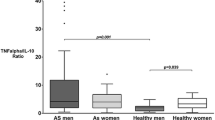Abstract
The role of microbial triggers in the pathogenesis of the ankylosing spondylitis (AS) has remained an active area of clinical and basic research but remains unresolved. We have recently found evidence of an important role for TLR4 in experimental reactive arthritis, raising the question to be addressed whether genetic polymorphisms in TLR4 affects susceptibility to AS. Innate immune responses to Gram-negative bacteria involve in a central role the binding of lipopolysaccharide to TLR4. Two commonly occurring SNPs in the human TLR4 gene (Asp299Gly and Thr399Ile) have been shown to be associated with increased risk of Gram-negative bacteremia in sepsis patients and with susceptibility to inflammatory bowel disease. It remains unresolved whether these SNPs are associated with AS and we have addressed this in a relatively genetically homogeneous population in Korea. A cohort of 200 Korean AS patients and 197 ethnically matched controls were studied. All patients were native Koreans with AS satisfying the modified New York criteria. Korean controls were examined and confirmed to be unaffected by AS. All subjects were genotyped for two functional SNPs in the TLR4 gene: Asp299Gly (A/G polymorphism) and TLR-4 (Thr399Ile) (C/T polymorphism) The Sequenom MassARRAY system was used for genotyping (Sequenom Inc., San Diego, CA, USA). All cases and controls were homozygous for the (A) allele for 299 variant and similarly for the 399 variant all cases and controls were homozygous for the (C) allele. Genetic-environmental interactions figure prominently in current concepts of the pathogenesis of AS. Our findings indicate that the polymorphisms in the TLR4 gene cannot be regarded as major contributors to AS susceptibility in the Korean population.
Similar content being viewed by others
References
Barton GM, Medzhitov R (2003) Toll-Like receptor signaling pathways. Science 300:1524–1525
Vabulas RM, Wagner H, Schild H (2002) Heat shock proteins as ligands of Toll-like receptors. Curr Top Microbiol Immunol 270:169–184
Lorenz E, Frees KL, Schwartz DA (2001) Determination of the TLR4 genotype using allele-specific PCR. Biotechniques 31:22–24
Arbour NC, Lorenz E, Schutte BC, Zabner J, Kline JN, Jones M et al (2000) TLR4 mutations are associated with endotoxin hyporesponsiveness in humans. Nat Genet 25:187–191
Agnese DM, Calvano JE, Hahm SJ, Coyle SM, Corbett SA, Calvano SE, et al (2002) Human toll-like receptor 4 mutations but not CD14 polymorphisms are associated with an increased risk of gram-negative infections. J Infect Dis 186:1522–1525
Brand S, Staudinger T, Schnitzler F, Pfennig S, Hofbauer K, Dambacher J et al (2005) The role of Toll-like receptor 4 Asp299Gly and Thr399Ile polymorphisms and CARD15/ NOD2 mutations in the susceptibility and phenotype of Crohn’s disease. Inflamm Bowel Dis 11:645–652
Török HP, Glas J, Tonenchi L, Mussack T, Folwaczny C (2004) Polymorphisms of the lipopolysaccharide-signaling complex in inflammatory bowel disease: association of a mutation in the Toll-like receptor 4 gene with ulcerative colitis. Clin Immunol 112:85–91
van der Paardt M, Crusius JB, de Koning MH, Morré SA, van de Stadt RJ, Dijkmans BA et al (2005) No evidence for involvement of the Toll-like receptor 4 (TLR4) A896G and CD14-C260T polymorphisms in susceptibility to ankylosing spondylitis. Ann Rheum Dis 64:235–238
Gergely P Jr, Blazsek A, Weiszhár Z, Pazár B, Poór G (2006) Lack of genetic association of the Toll-like receptor 4 (TLR4) Asp299Gly and Thr399Ile polymorphisms with spondylarthropathies in a Hungarian population. Rheumatology 45:1194–1196
Adam R, Sturrock RD, Gracie JA (2006) TLR4 mutations (Asp299Gly and Thr399Ile) are not associated with ankylosing spondylitis. Ann Rheum Dis 65:1099–1101
Snelgrove T, Lim S, Greenwood C, Peddle L, Hamilton S, Inman R, Rahman P (2007) Association of Toll-like Receptor 4 Variants and Ankylosing Spondylitis: a case-control study. J Rhematol 34:368–370
Moll JM, Wright V (1973) New York clinical criteria for ankylosing spondylitis. A statistical evaluation. Ann Rheum Dis 32:354–363
Okayama N, Fujimura K, Suehiro Y, Hamanaka Y, Fujiwara M, Matsubara T et al (2002) Simple genotype analysis of the Asp299Gly polymorphism of the toll-like receptor-4 gene that is associated with lipopolysaccharide hyporesponsiveness. J Clin Lab Anal 16:56–58
Guo QS, Xia B, Jiang Y, Morré SA, Cheng L, Li J, Crusius JB, Penã AS (2005) Polymorphisms of CD14 gene and TLR4 gene are not associated with ulcerative colitis in Chinese patients. Postgrad Med J 81:526–529
Kim TH, Rahman P, Jun JB, Lee HS, Park YW, Im HJ et al (2004) Analysis of CARD15 polymorphisms in Korean patients with ankylosing spondylitis reveals absence of common variants seen in western populations. J Rheumatol 31:1959–1961
Choe JY, Crain B, Wu SR, Corr M (2003) Interleukin 1 receptor dependence of serum transferred arthritis can be circumvented by toll-like receptor 4 signaling. J Exp Med 197:537–542
Zhang X, Glogauer M, Zhu F, Kim TH, Chiu B, Inman RD (2005) Innate immunity and arthritis: neutrophil Rac and toll-like receptor 4 expression define outcomes in infection-triggered arthritis. Arthritis Rheum 52:1297–1304
Schröder NW, Schumann RR (2005) Single nucleotide polymorphisms of Toll-like receptors and susceptibility to infectious disease. Lancet Infect Dis 5:156–164
Radstake TR, Franke B, Hanssen S, Netea MG, Welsing P, Barrera P et al (2004) The Toll-like receptor 4 Asp299Gly functional variant is associated with decreased rheumatoid arthritis disease susceptibility but does not influence disease severity and/or outcome. Arthritis Rheum 50:999–1001
Author information
Authors and Affiliations
Corresponding author
Rights and permissions
About this article
Cite this article
Na, KS., Kim, TH., Rahman, P. et al. Analysis of single nucleotide polymorphisms in Toll-like receptor 4 shows no association with ankylosing spondylitis in a Korean population. Rheumatol Int 28, 627–630 (2008). https://doi.org/10.1007/s00296-007-0490-7
Received:
Accepted:
Published:
Issue Date:
DOI: https://doi.org/10.1007/s00296-007-0490-7



